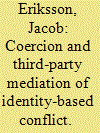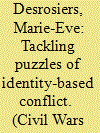| Srl | Item |
| 1 |
ID:
164984


|
|
|
|
|
| Summary/Abstract |
This article analyses third-party mediation of identity-based conflicts, which are notoriously difficult to resolve. It seeks to reconcile the contradiction in the mediation literature between the need for less coercive strategies to ensure ownership of a peace agreement and the need for more coercive strategies to reach a final agreement. Through an analysis of mediation of the Israeli-Palestinian conflict, the article makes four contributions to existing literature. First, the article develops a theoretical ‘best fit’ model that proposes a u-shaped relationship between intensity of mediator coercion and transition through phases of negotiation. Second, it challenges the prevailing notion that pre-negotiation does not involve coercion. Third, it suggests that epistemological and ontological understandings of a conflict and the role of a mediator by both the mediator and the parties mean that mediators enjoy limited capacity to effectively shift from high- to low-coercive strategies. Multi-party mediation can provide the flexibility needed to execute the coercion u-curve effectively. Fourth, it challenges existing understandings of the US-mediated negotiations during the Annapolis process, 2007–08.
|
|
|
|
|
|
|
|
|
|
|
|
|
|
|
|
| 2 |
ID:
144449


|
|
|
|
|
| Summary/Abstract |
This article assesses explanations of identity-based violence, evaluating in particular framing theory's strengths. It argues that framing specifies some of the key mechanisms and processes between factors too often studied in vacuum: the purposefulness of human beings, social structures, as well as environmental factors and opportunities. Framing therefore suggests answers to the main puzzles in conflict studies and enjoys a broader explanatory reach than existing perspectives because it coherently integrates existing theoretical insights, as well as takes us beyond them.
|
|
|
|
|
|
|
|
|
|
|
|
|
|
|
|